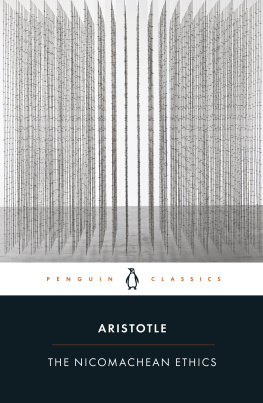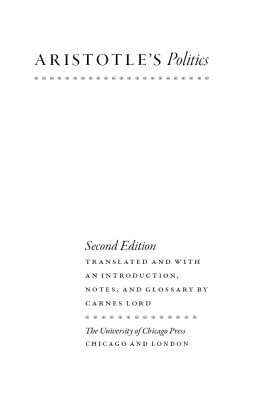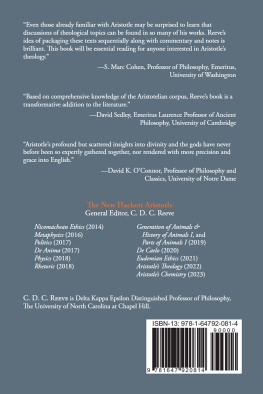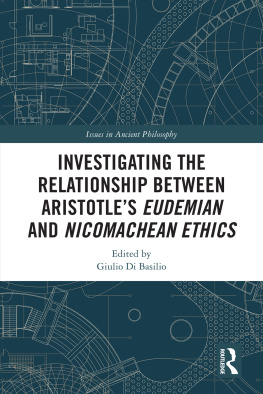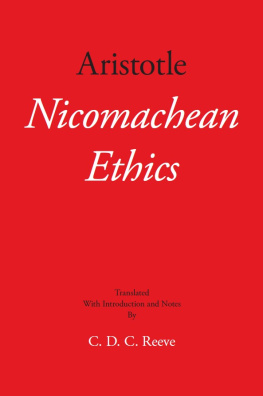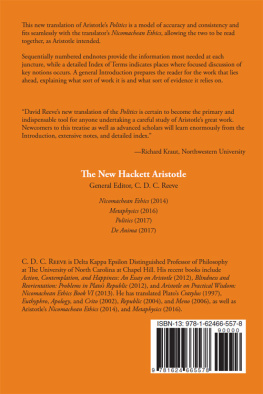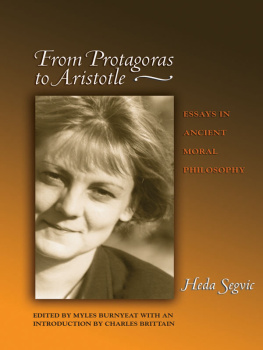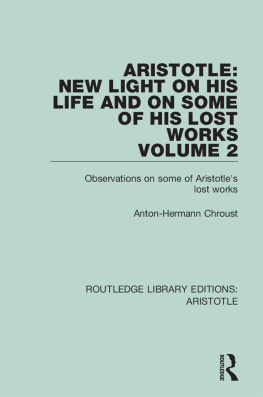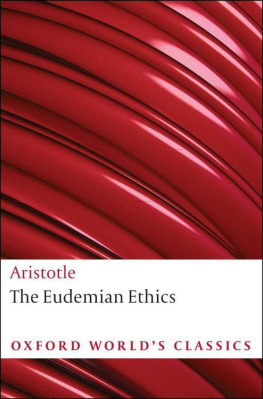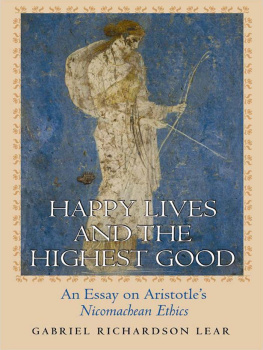Aristotle - The Nicomachean Ethics
Here you can read online Aristotle - The Nicomachean Ethics full text of the book (entire story) in english for free. Download pdf and epub, get meaning, cover and reviews about this ebook. year: 2020, publisher: Penguin Books Ltd, genre: Religion. Description of the work, (preface) as well as reviews are available. Best literature library LitArk.com created for fans of good reading and offers a wide selection of genres:
Romance novel
Science fiction
Adventure
Detective
Science
History
Home and family
Prose
Art
Politics
Computer
Non-fiction
Religion
Business
Children
Humor
Choose a favorite category and find really read worthwhile books. Enjoy immersion in the world of imagination, feel the emotions of the characters or learn something new for yourself, make an fascinating discovery.
- Book:The Nicomachean Ethics
- Author:
- Publisher:Penguin Books Ltd
- Genre:
- Year:2020
- Rating:4 / 5
- Favourites:Add to favourites
- Your mark:
- 80
- 1
- 2
- 3
- 4
- 5
The Nicomachean Ethics: summary, description and annotation
We offer to read an annotation, description, summary or preface (depends on what the author of the book "The Nicomachean Ethics" wrote himself). If you haven't found the necessary information about the book — write in the comments, we will try to find it.
The Nicomachean Ethics — read online for free the complete book (whole text) full work
Below is the text of the book, divided by pages. System saving the place of the last page read, allows you to conveniently read the book "The Nicomachean Ethics" online for free, without having to search again every time where you left off. Put a bookmark, and you can go to the page where you finished reading at any time.
Font size:
Interval:
Bookmark:
ARISTOTLE was born in 384 BC in Stagira in the northern Aegean. His father, Nicomachus, was personal physician to King Amyntas of Macedon. Aged about seventeen, he moved to Athens and became a student in Platos Academy, where he remained for the next twenty years. Around the time of Platos death in 347 he moved to Assos, in modern-day Turkey, where he attached himself to the household of his friend Hermias, the local ruler. He married Hermias niece, Pythias. In Assos, and then in Mytilene on the island of Lesbos, he pursued intensive research in marine biology. In 343 he returned to his native Macedonia to serve as tutor to King Philips young son, the future Alexander the Great, a post he held for two or three years. After Alexander succeeded to the throne in 336, Aristotle returned to Athens and established his own school, the Lyceum. He attracted a large number of young scholars, and he taught there on a wide range of philosophical and scientific questions for the next twelve years. The Peripatetic (i.e. Aristotelian) school of philosophy takes its name from the peripatos, the Lyceums covered walkway where he gave his lectures. Following Alexanders death in 323, there was a surge of anti-Macedonian feeling in Athens, and Aristotle was formally charged with impiety. He went into voluntary exile in Chalcis in Euboea, where he died the following year at the age of sixty-two. The philosophical dialogues he published during his lifetime have all been lost. But his students preserved other extensive writings, apparently derived from research notes and lecture materials, on a huge variety of topics metaphysics, theology, physics, astronomy, biology, zoology, psychology, epistemology, logic, rhetoric, aesthetics, politics and ethics that profoundly shaped the course of ancient, medieval and Renaissance thought, and continue to be widely read and appreciated by philosophers today. Besides the Nicomachean Ethics, the Penguin Classics series offers editions of the Politics, the Metaphysics, the De Anima, The Art of Rhetoric, the Poetics and The Athenian Constitution.
ADAM BERESFORD is Associate Professor of Philosophy at the University of Massachusetts, Boston. He has previously translated Platos Protagoras and Meno for Penguin Classics.

PENGUIN BOOKS
UK | USA | Canada | Ireland | Australia
India | New Zealand | South Africa
Penguin Books is part of the Penguin Random House group of companies whose addresses can be found at global.penguinrandomhouse.com.

First published in Penguin Classics 2020
Translation and editorial material copyright Adam Beresford
The moral rights of the translator have been asserted
Cover: Mona Hatoum, Impenetrable (s version), 2010 Mona Hatoum
Courtesy Galerie Max Hetzler, Berlin | Paris (Photo: def image)
ISBN: 978-0-141-39524-1
This ebook is copyright material and must not be copied, reproduced, transferred, distributed, leased, licensed or publicly performed or used in any way except as specifically permitted in writing by the publishers, as allowed under the terms and conditions under which it was purchased or as strictly permitted by applicable copyright law. Any unauthorized distribution or use of this text may be a direct infringement of the authors and publishers rights and those responsible may be liable in law accordingly.
My aim here is not to walk the reader through everything Aristotle says in each book of this famous treatise. It makes more sense for you to read its arguments for yourself. Nor do I plan to spend much time explaining Aristotles key terms and concepts or warning you about his strange vocabulary. The translation is in standard English, and does not contain too many terms that need much explanation, or, I hope, anything that you wont be able to understand well enough when you come across it on your own (with a little help from the relevant notes from time to time).
Instead, I will briefly discuss the unusual form and the physical origin of this peculiar work, then pick out two of its more important philosophical features, which I hope will bring out some of what is distinctive and innovative and rich in Aristotles approach and maybe shed a little light on his character.
I warn the reader that nothing that follows is entirely uncontroversial. But if I had to confine myself to claims that no scholar would disagree with, I would have to say nothing at all.
*
What is the Nicomachean Ethics? What kind of text is this? How was it first produced? How did it take its current form?
You dont always have to ask questions of that sort of a major philosophical work, but theyre appropriate in this case, because we dont know. At least, not with any certainty.
For that matter, what does the odd title, thika Nikomacheia, even mean? It probably originated as a librarians tag, for use within the Lyceum (the school that Aristotle founded in Athens), rather than as the informative title of a published work. It is opaque enough to have confused readers for millennia. Ever since late antiquity, people have wrongly thought that it meant A Treatise on Ethical Questions, Dedicated to [my son] Nicomachus. Aristotle did have a son called Nicomachus, and Nicomachus probably has something to do with the title. But this treatise was certainly not dedicated to him.
Put that bit of the title to one side for now. The other bit seems straightforward enough. The Greek term thika means relating to character (Greek for character is thos). And various ancient sources suggest that this was shorthand for thika hupomnmata: not just things relating to character, but more precisely notes on character, or records on character. And that, in turn, probably means records [of Aristotles lectures] on character. In origin, and especially in the context of philosophy, hupomnmata meant records of a lecture.
Thats to say, these are not the notes from which Aristotle delivered his lectures (as is widely believed) or notes that he wrote himself and gave to his students. These are records of the lectures as delivered, taken down by someone who attended them, written up and edited later.
There are two parallel sets of thika in the surviving Aristotelian corpus. We have the Nicomachean Ethics and the Eudemian Ethics. Curiously, their three central books are identical (the common books). Outside of those, they shadow one another, and make most of the same claims, often to the point of having very similar arguments (complete with the same examples), but never to the point of being the same text. Here and there they diverge on important details of philosophical doctrine. It seems that Aristotle gave essentially the same course of lectures over and over again (every year, say, like a modern university professor) and that they were taken down at least twice, perhaps a few years apart, perhaps many years apart, by two different listeners. The extensive and systematic similarities between these two sets of records, but also the fact that (outside the common books) they are two fully independent and separately formed texts, can be quite neatly explained that way.
Most surviving Aristotelian treatises started as his lecture courses. Thats why they are so unlike the great works of Greek literary prose. We think they derive from lectures he gave in the Lyceum in the 330s and 320s BC , the final phase of his career. They were probably then written up in the decades following his death, and may not have been more widely published till much later than that. He did also produce works for publication that were widely read and admired including for a fine prose style that is sadly absent here and he occasionally mentions their existence, rather sheepishly. For some reason none of those has come down to us.
Font size:
Interval:
Bookmark:
Similar books «The Nicomachean Ethics»
Look at similar books to The Nicomachean Ethics. We have selected literature similar in name and meaning in the hope of providing readers with more options to find new, interesting, not yet read works.
Discussion, reviews of the book The Nicomachean Ethics and just readers' own opinions. Leave your comments, write what you think about the work, its meaning or the main characters. Specify what exactly you liked and what you didn't like, and why you think so.

